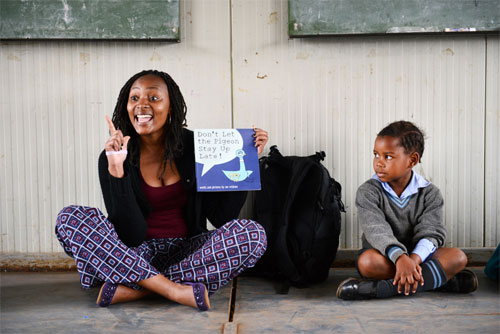Are parents school-ready?
Many children do not have access to quality ECD programmes and require more support in the Foundation Phase, not only from teachers but their parents too. Adopt-a-School asks whether parents are well equipped enough to support their children.
A lot of emphasis is placed on the school readiness of learners in South Africa, with some schools assessing children's emotional, social, physical and intellectual development to assess whether they are ready to embark on their formal school careers. This concept of school readiness brings with it a key assumption made about learners which is that they begin school with a certain level of cultural capital.
The level of cultural capital that a child has is dependent on their early experiences, i.e. their early childhood development (ECD) experiences. Looking particularly at the sub-Saharan setting, a great number of children do not have access to quality ECD programmes and ECD centres. This leads to children starting formal education with a deficit in what is required of them to succeed at school. This deficit leads to learners requiring more support in the Foundation Phase of formal schooling, not only from teachers but their parents too. The question that arises is, are parents well equipped to support their children? In other words, are parents in the sub-Saharan context 'school-ready'?
Having worked in private schools, former model C schools and now rural schools it is my experience that regardless of their level of education, parents are not necessarily 'school-ready'. I believe that the relationship that is formed between schools and parents can significantly influence a parent's ability to support their children. Because each child is different there is no right way of supporting one's child. There are a couple of key things parents can do to further understand their role in their children's education:
- Introducing themselves to their child's teacher, making sure that they build a positive relationship with the teacher.
- Ensuring that they are in constant communication with their child about what they are doing at school and if any issues arise communicating with the teacher about it.
- Trying to understand the basic learning methods that their children are using at school to ensure that no confusion is caused when attempting to support their child.
- Understanding that each child is unique and so is their schooling journey. Patience and interest from parents is key.
About Andisiwe Hlungwane
Andisiwe Hlungwane is a Programme Manager at Adopt-a-School Foundation with five years experience as a Foundation Phase teacher. She is passionate about tackling the educational deficiencies that manifest not only in South Africa but the African continent through innovative world-class teaching and learning methods. She has been selected as an African Union Youth Volunteer Fellow in 2016.
She holds a Bachelor of Commerce degree and PostGraduate Certificate in Education from Rhodes University, Grahamstown, South Africa. Additionally, she completed a Bachelor of Education Honours degree and a Master of Education from the University of Witwatersrand, Johannesburg, South Africa, with a research focus on teachers' conceptions of their professional identity and ways in which they negotiate this in relation to their membership in teacher trade unions.
Andisiwe is part of a broader team of education and development specialists working in the Skills and Social Development department at Adopt-a-School Foundation.Adopt-a-School Foundation is a non-profit organisation that supports the creation and enhancement of a conducive learning and teaching environment in disadvantaged schools.























